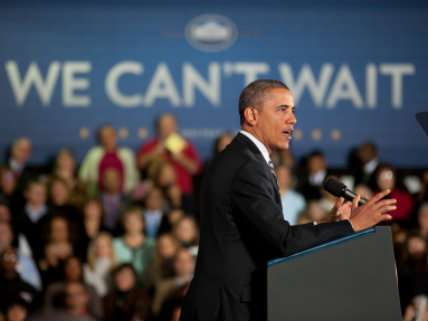The Complicated Politics of Obama's Delayed Action on Immigration

Back in June, President Obama publicly declared that because Congress had failed to pass an immigration overhaul bill, he would take on the responsibility himself. "I'm beginning to fix as much of our immigration system as I can on my own, without Congress," he said. He would act, on his own, through executive actions—and he would do so by the end of the summer. Reports indicated that Obama was considering granting provisional legal status to as many as half of the nation's illegal immigrants.
Looks like we'll be waiting a little while longer. At the end of last week, amid mounting concerns that executive action on immigration could hurt Democrats in tight races in this year's mid-term election, the White House made known that it would stall the move until sometime after the election.
Republicans have decried the move as another illegal executive action, and immigration activists are worried that it may never happen at all. Here are a few thoughts on the potential move and the complicated politics surrounding it.
It's probably legal. As Jonathan Adler, a law professor at Case Western Reserve University, recently wrote at The Washington Post, "immigration law is an area in which — for good or ill — Congress has given the executive wide latitude." Whether or not you think it's good policy, he says, "there's a strong case the actual law is on the president's side." The Reason Foundation's Shikha Dalmia explains some of those reasons here.
The delay is almost entirely political. The administration is barely even trying to pretend otherwise. The opening of an unnamed White House officials email to Washington Post blogger Greg Sargent reads, "the reality the President has had to weigh is that we're in the midst of the political season." Another official tells the New York Times that the White House is reacting to the "political hothouse environment."
The fact is that the move is almost entirely about concerns that movement on immigration now could jeopardize Democratic chances in close Senate races this November. Those races are going to hinge on turnout—and a controversial, go-it-alone move from President Obama on legalization could bring more Republican voters to the polls.
The potential flip side of that, of course, is the move could depress turnout amongst pro-immigration Democrats. And it's clear that immigration activists are not happy. The administration says the move is still coming, but there's skepticism that it could be put off permanently. "All the progress we've made over two years was destroyed in six weeks," ImmigrationWorks USA head Tamar Jacoby told The New York Times. "Given the string of broken promises from this president to the Latino community on immigration, there is a real question as to whether he will follow through," America's Voice director said to the paper.
But the administration seems to have decided it's worth the risk. Basically, the White House is betting that the GOP's negative response to a pre-election announcement would be more significant than whatever effect this has on Democratic turnout.
It's good for immigrants—but it may not be good for long-term immigration politics. There's no question that the immigrants granted legal status by the move would benefit. But I'm less confident that it will have a positive effect on the immigration debate as a whole. Sweeping unilateral executive action on such a controversial issue could well polarize the immigration debate further, and make it harder to find a workable, sustainable long-term solution.
It's not a perfect parallel, but you can look at what has happened with Obamacare, another big-deal policy that was passed with no bipartisan support over the loud objections of the opposition party. Democrats thought that opposition would quickly fade, but it hasn't. Instead, it's settled in. To a lesser extent, the same dynamic has played out with climate change. Democrats have pushed for sweeping legislation and unilateral executive action, and Republican opposition, which had softened somewhat during the Bush era, has intensified.
On the other hand, if you look at an issue like loosening marijuana restrictions, the opposite is true. It's an issue where we've seen some support from both Republicans and Democrats, and where, instead of sweeping national change, we've instead seen incremental local experimentation. Yes, it's a slower process, but that allows for a kind of adjustment period, which can be helpful. The result is that national support for legalization has grown rapidly, with 58 percent of adults now saying they favor legalization, and 39 percent saying they strongly favor it, according to Civic Science poll released last week. It's a local, experimental, incremental approach, and the public is going along with it.
The Obama administration understands that lack of public buy-in is a problem. "I want to spend some time, even as we're getting all our ducks in a row for the executive action, I also want to make sure that the public understands why we're doing this, why it's the right thing for the American people, why it's the right thing for the American economy," President Obama said on NBC's Meet the Press over the weekend. The question, though, is whether a little more explanation and a little more time is really going to help.


Show Comments (87)